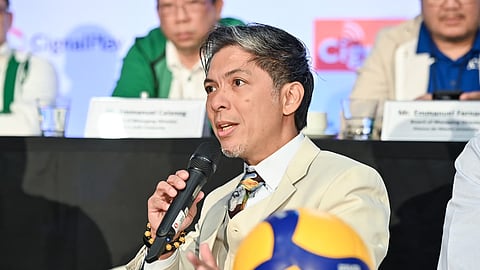
- NEWS
- the EDIT
- COMMENTARY
- BUSINESS
- LIFE
- SHOW
- ACTION
- GLOBAL GOALS
- SNAPS
- DYARYO TIRADA
- MORE

Student-athletes transferring from a member school to another will serve a one-year residency and have an additional year shaved off their playing eligibility under a revised University Athletic Association of the Philippines (UAAP) rule.
League executive director Atty. Rebo Saguisag announced the development during Wednesday’s Season 87 press conference at the Novotel Manila.
Effective starting the 2024-25 academic year, student-athletes for all sports at the collegiate level switching schools will still be required to sit out a year.
An additional year, however, will be deducted from the transferee’s playing eligibility.
“The UAAP, as a collegial body, decided that any transfer made after the academic year 2023-2024 will not only incur the usual residency requirement but will now be charged with an additional eligibility year, making it a total of two years,” Saguisag said.
“In simpler terms, the residency period will remain the same but only the playing years of the transferee will be affected,” he added.
Under the rule, a true freshman with five years of playing eligibility transferring to another member school will only have two remaining playing years for the school he or she has transferred to. A sophomore switching schools will have a one-and-done eligibility.
The league has seen a trend of transfers in recent years especially in the first semester centerpiece sport men’s basketball.
“Interestingly, that is where we are coming from, we have to consider. As much as we protect, we guarantee the protection of the rights of each and every student-athlete, we have to balance that to other interests. I’m talking about the member-schools per se and the UAAP as a collective,” he explained.
“So, there are three parties concerned here that we need to balance their interests because at the end of the day, a better member-school will lead to a better UAAP which leads to a better environment for the student-athlete.”
Transfers made prior to the 2024-25 academic year are not affected by the new eligibility rule.
Such are the cases of former National University guard Kea Baclaan who went to repeat-seeking De La Salle University and Rey Remogat who took off his University of the East uniform to join University of the Philippines as they both enrolled with their new schools in the second semester of the previous year.
Gilas Pilipinas member Mason Amos, who made the switch from Ateneo de Manila University to La Salle in the first semester of 2024-25 calendar, according to Saguisag is “technically covered but will not be affected immediately.”
“There’s already a board resolution. But interesting thing about it, the effect will only be felt in reality once he continues to enroll in the particular school and submits (his papers) for eligibility,” Saguisag said.
“He only sits one year then next year he’ll be able to play.”
The amended rules, however, have met opposition especially from Senator Pia Cayetano, author of the Student-Athletes Protection Act.
“We’re ready to defend if called upon. Allow me to state, however, that is the beauty and gift of democracy, everybody has their own views and their own perspective and we understand and respect where she’s coming from,” Saguisag said.
“However, let me state for the record that all of us in this room, the welfare and interest of each and every student-athlete is of paramount importance.”
